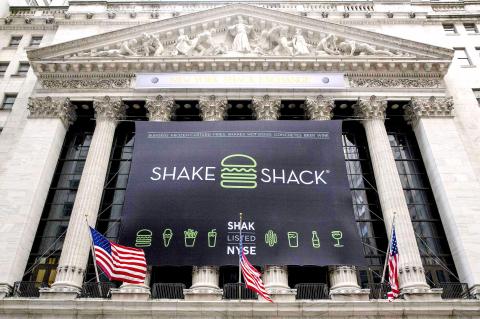Shake Shack, the hipster-ish burger chain that began as a hot dog stand in Madison Square Park a decade ago, was valued at nearly US$2 billion when it floated on the New York Stock Exchange on Friday.
Shares in the company soared by more than 150 percent to US$52.50 before easing back to US$48 — still more than double the US$21 offer price.
At the high, founder Danny Meyer’s 31 percent stake was worth nearly US$400 million. Meyer, 56, an established New York City restaurateur, owns popular establishments Blue Smoke, Gramercy Tavern and Union Square Cafe.

Photo: Reuters
“We didn’t have any dreams that today would ever come,” he told CNBC from the floor of the stock exchange. “We wanted to open a hot dog cart to help … Madison Square Park. And when you put a great product together with amazing people with the kind of heart that you have felt here on the floor, these people are doing it, and it’s our staff that this day is for.”
The company, which now operates 63 outlets in nine countries, had already increased its initial public offering (IPO) price range from US$14 to US$16 per share to between US$17 and US$19.
The company tweeted that it would celebrate the IPO success by giving out free burgers outside “the New York SHACK Exchange.”
It is also “spreading some Shack love” throughout New York City, with an open-top Shake bus touring Manhattan.
Shake Shack might sound like an unusual name for a burger joint, but it is catchier than the other options Meyer was tossing around when he first set up shop in 2001.
“We entertained a bunch of names for the kiosk (most of them pretty bad — like Custard’s First Stand, Dog Run and Madison Mixer) and ultimately settled on Shake Shack,” he said in a letter to prospective shareholders.
The company, which has opened across the Middle East, Russia, Turkey and in a prime location in London’s Covent Garden, is growing sales fast. Revenue in the first nine months of last year rose by 41 percent to US$84 million. With the funding from the IPO, Meyer hopes to open 10 new company-owned stores a year, with a target of 450 in the long term.
Shake Shack’s good fortune comes at the expense of McDonald’s, which last week reported its worst results in a decade and axed its chief executive.
The departure of Don Thompson, McDonald’s first African American chief executive, was announced on Wednesday night. He will be replaced by Briton Steve Easterbrook, the company’s chief brand officer and the former boss of McDonald’s in the UK and northern Europe.
Thompson was axed under pressure from investors. Last week, McDonald’s reported a 15 percent fall in annual profits to US$4.7 billion.

SEEKING CLARITY: Washington should not adopt measures that create uncertainties for ‘existing semiconductor investments,’ TSMC said referring to its US$165 billion in the US Taiwan Semiconductor Manufacturing Co (TSMC, 台積電) told the US that any future tariffs on Taiwanese semiconductors could reduce demand for chips and derail its pledge to increase its investment in Arizona. “New import restrictions could jeopardize current US leadership in the competitive technology industry and create uncertainties for many committed semiconductor capital projects in the US, including TSMC Arizona’s significant investment plan in Phoenix,” the chipmaker wrote in a letter to the US Department of Commerce. TSMC issued the warning in response to a solicitation for comments by the department on a possible tariff on semiconductor imports by US President Donald Trump’s

The government has launched a three-pronged strategy to attract local and international talent, aiming to position Taiwan as a new global hub following Nvidia Corp’s announcement that it has chosen Taipei as the site of its Taiwan headquarters. Nvidia cofounder and CEO Jensen Huang (黃仁勳) on Monday last week announced during his keynote speech at the Computex trade show in Taipei that the Nvidia Constellation, the company’s planned Taiwan headquarters, would be located in the Beitou-Shilin Technology Park (北投士林科技園區) in Taipei. Huang’s decision to establish a base in Taiwan is “primarily due to Taiwan’s talent pool and its strength in the semiconductor

Industrial production expanded 22.31 percent annually last month to 107.51, as increases in demand for high-performance computing (HPC) and artificial intelligence (AI) applications drove demand for locally-made chips and components. The manufacturing production index climbed 23.68 percent year-on-year to 108.37, marking the 14th consecutive month of increase, the Ministry of Economic Affairs said. In the first four months of this year, industrial and manufacturing production indices expanded 14.31 percent and 15.22 percent year-on-year, ministry data showed. The growth momentum is to extend into this month, with the manufacturing production index expected to rise between 11 percent and 15.1 percent annually, Department of Statistics

An earnings report from semiconductor giant and artificial intelligence (AI) bellwether Nvidia Corp takes center stage for Wall Street this week, as stocks hit a speed bump of worries over US federal deficits driving up Treasury yields. US equities pulled back last week after a torrid rally, as investors turned their attention to tax and spending legislation poised to swell the US government’s US$36 trillion in debt. Long-dated US Treasury yields rose amid the fiscal worries, with the 30-year yield topping 5 percent and hitting its highest level since late 2023. Stocks were dealt another blow on Friday when US President Donald